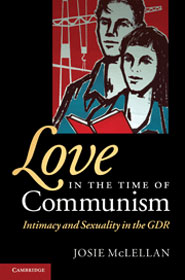The way we see life behind the Iron Curtain may never be the same again thanks to a groundbreaking history of East Germany’s forgotten sexual revolution, published this week by a University of Bristol researcher.
Love in the Time of Communism: Intimacy and Sexuality in the German Democratic Republic by Dr Josie McLellan of the Department of History reveals previously untold stories of the everyday emotional lives of East Germans.
Under communism divorce rates soared, abortion become commonplace and the rate of births outside marriage was amongst the highest in Europe. Nudism went from ban to state-sponsored boom, and erotica became common currency in both the official economy and the black market.
The book asks why this ‘sexual revolution’ took place, concluding that East Germans had more control over their private lives than Orwellian imaginings of life in the Eastern Bloc might suggest.
Dr McLellan said: “Despite the state’s best efforts to encourage its citizens onto the path of marriage and child rearing, infidelity and even partner swapping were commonplace, and work colleagues exchanged pornography as a matter of course. Even gay men and lesbians, who struggled to win acceptance from the state, organised underground parties and audacious political protests.”
“What’s interesting is that the state also used sex for its own ends too. Sex advice manuals tried to help couples improve their love lives, and official magazines carried nude photographs and racy articles. On a darker note, the Stasi did not hesitate to use prostitutes and ‘Romeo agents’ as a means of gathering information about potential enemies of the regime.
Love in the Time of Communism, described by Professor Mary Fulbrook from University College London as ‘outstanding, intriguing, and illuminating’ draws on secret police files, photographs and home movies, novels and poems, and interviews with former East Germans.
The research for this project was funded by grants from the Leverhulme Trust and the British Academy.
Love In The Time Of Communism: Intimacy and Sexuality in the German Democratic Republic is published by Cambridge University Press, £17.99
